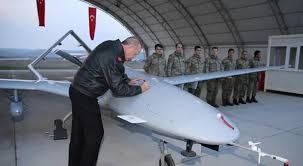
Turkey’s surprising military achievements in Libya have turned the tide of not only the war between Hefter and Sarraj but also the regional competition between Turkey and its regional competitors, namely, the United Arab Emirates and Egypt. The military intervention of Turkey changed the balance of power significantly in favor of the GNA, thanks to its drone technology. Developed by Erdogan’s son-in-law, Turkish drones had also wreaked havoc on Syrian targets in Idlib, outsmarting the advanced Russian air defense systems. These achievements boosted morale in Ankara and demonstrated that it has the power to shape developments in the region.
Ironically, Turkey’s military might also makes it vulnerable to regional threats. Its recent military successes have undoubtedly heightened the risks of escalation with the regional rivals. Failing to achieve desired military results with non-state proxies in the conflict zone, Turkey had to deploy troops on the ground. Turkey’s military engagement in Libya, albeit limited and sustainable (for the time being), and its recent military confrontation with the Syrian regime forces in Idlib showed the dangers of putting soldiers on the front lines. The Turkish soldiers have become vulnerable targets for the actors who want to punish Turkey. Whereas, the other regional actors mostly rely on proxies that are cheaper and politically pose less risks. This asymmetry may be costly for Turkey in the long run, especially if Syrian and Libyan crises continue to exacerbate.
The use of proxies in the region have so far prevented direct military confrontations between the regional states. However, the increasing presence of Turkish military in the region, coupled with its superiority in drone technology, has certainly alarmed its rivals. It can be expected that other regional actors are massively investing in this area. This can further plunge all sides into arms competition and deepen distrust in Turkey.
The risks for Turkey are not confined with the future balance of military power in the region. The main strategic disadvantage of Turkey is its loneliness in this regional rivalry, which can render its current tactical superiority on the ground ineffective. None of the major actors in the Middle East, including the United States, Russia and the EU, give backing to Turkey. What is worse is that Ankara helps unite its rivals by wrong actions. On May 11, Egypt, Greece, France, Cyprus and the UAE released a joint statement targeting Ankara’s policies in Eastern Mediterranean and Libya. Most recently, Italy, which had been closer to the GNA government in Libya, signed a maritime limitation deal with Greece – a deal which conflicts with Ankara’s thesis.
Ankara’s aggressive and highly pragmatist policies have played a key role in Turkey’s diplomatic isolation in recent years. On top of this, Turkey’s maritime delimitation agreement with Sarraj government in return for Turkish military support have negatively affected Turkey’s relations with the coastal states. The deal, which practically allows Turks to cut the Mediterranean in the middle, is unacceptable for other states, particularly Greece. Yet, by ratifying the deal in the Turkish Parliament, Ankara has given a strong legal status, at the national level, to the document and thereby lost much of its bargaining flexibility in this issue. Now, although Sarraj’s military victory is a necessary condition for securing Turkey’s diplomatic position, it is not a sufficient one. Apparently, other coastal states and the EU will continue to reject the legitimacy of the Turkish thesis even in the case of a GNA victory. This complicates the Turkish diplomatic efforts to turn these military gains into political achievements.
Ankara’s rejection of Hefter’s ceasefire offer shows the increasing confidence that the Turkish government enjoys in these days. Erdogan’s statements indicate that the GNA will continue to be on the offensive. Yet, Libya is only a battle in much larger struggle in the region now. Ankara has significantly militarized and marginalized its foreign policy for past few years. Its policies antagonize not only the UAE and Egypt but also Greece and other European countries. This situation can solidify the anti-Turkish alliance and further Ankara’s political isolation. Consequently, preliminary military achievements can consume Turkey in the long run politically and economically.